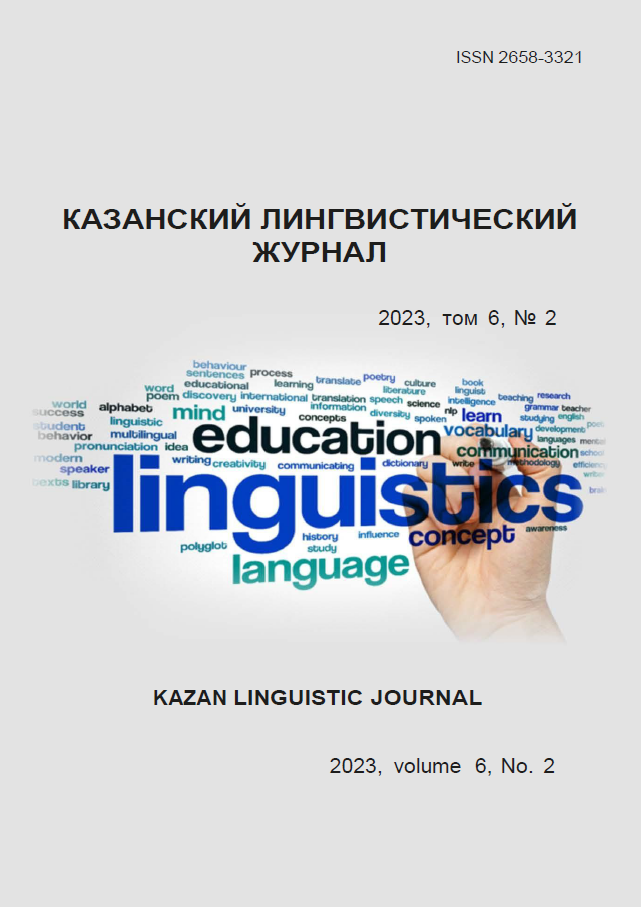Tribalism in the Cameroonian Political Discourse
https://doi.org/10.26907/2658-3321.2023.6.2.246-256
Keywords:
tribalism, political discourse, communicative portrait of a politician, ethno-cultural society, verbal aggressionAbstract
This article is devoted to the study of tribalism, which manifests itself in the speech of political actors. Typical communicative acts are considered here, which are realized in the speeches of Cameroonian politicians, who use the strategy of discrediting the opponent to represent group isolation, which is characterized by internal clan isolation and exclusivity.
To carry out linguistic analysis, linguo-cognitive and semantic research methods were used, with the help of which the ways that ideology and tribal power are constantly used both in everyday conversational discourse and in political communication, as well as in the media, were identified. This gives the possibility to consider the communicative portrait of the Cameroonian politician. The study founds that speakers often do not realize that the words they use really influence and affect the thoughts, actions, morale and emotional state and feelings of the listener, and hence his behavior. It was investigated and observed how the principle of cooperation is implemented, how often it is ignored, whether politicians neglect the rules and ethics of maintaining good social relations, which is manifested in the language of an ethno-cultural community. The study establishes that tribalism manifests itself in verbal aggression, has devastating consequences as well as being part of the impact at the linguistic level on individuals and on the nation as a whole. It is concluded that much depends on the difficult language situation that has developed in Cameroon, when some leaders speak English, others speak French, and there are no politicians who speak their native language at all.
References
References
Klyuyev YU.V. Рolitical discourse in mass communication: ananalysis of public po-litical interaction. M.: Direkt-Media; 2016.(In Russ.)
Yakhin M.A., Sakayeva L.R. Concept as a basic feature of cognitive linguistics in the works of domestic and foreign linguists. Kazan Linguistic Journal. 2019;4(2):38–47. (In Russ.)
Hobfoll Stevan E. Tribalism: The Evolutionary Origins of Fear Politics. L.: Palgrave Macmillan; 2018.
Clark С., Winegard B. Tribalism in War and Peace: The Nature and Evolution of Ideological Epistemology and Its Significance for Modern Social Science. Availa-ble from: https://www.researchgate.net/publication/338754119_Tribalism_in_War_and_Peace_The_Nature_and_Evolution_of_Ideological_Epistemology_and_Its_Significance_for_Modern_Social_Science [accessed: 16.02.2023].
Blazhevich YU.S. Ethno-linguistic and cultural situation in Cameroon. Scientific notes of the Oryol State University. 2018;1(78):90–92. (In Russ.)
Blazhevich YU.S. The fate of European languages in Cameroon: a monograph. M.: Flint; 2021. (In Russ.)
Kornyakova M.V. Home among strangers: modern tribalism and its impact on the state. Sat. articles. Simferopol, publishing house of the Crimean Federation University; 2020:82–99. (In Russ.)
Takhtarova S.S., Pavlov D.V. Communicative portrait as the main means of creating the character image (based on novel by Anthony Burgess “Doctor is sick“). Kazan Linguistic Jour-nal. 2019;2(2):90–97. (In Russ.)
Shcherbinina YU. V. Verbal aggression. Territory of hostility. M.: Forum; 2012. (In Russ.)
Mikhalеva O. L. Political discourse as a sphere for the implementation of manipula-tive influence: author. for an apprenticeship Ph.D. philol. Sciences. Kemerovo. 2004.
Vorontsova T.A. Speech aggression in the communicative-discursive paradigm. Vestnik VSU, Series Linguistics and Intercultural Communication. 2006;(1):83–86. (In Russ.)
Bagana ZH. Peculiarities of word formation in the Cameroonian version of French. Uchenye zapiski Oryol State University. 2018;2(79):67–70.
Aznacheeva E.N. et al. Discourse: functional-pragmatic and cognitive aspects. Col. Monograph. Chelyabinsk: Publishing house Chelyab. State University; 2008.
Paul Biya's publication on Facebook, 03.05.2019. Available from: https://www.lebledparle.com/fr/politique-cameroun/1107537-paul-biya-vous-devez-vous-defier-des-marchands-d-illusion [accessed: 15.03.2023].
Article of the “Journal du Cameroun.com”. Available from: https://www.journalducameroun.com/en/news-in-brief/i-did-not-choose-to-be-born-bamileke-maurice-kamto/[accessed: 22.03.2023].
Maurice Kamto: Ex-Cameroon minister claiming to be president-elect, 09.10.2018. Available from: https://www.africanews.com/2018/10/09/maurice-kamto-ex-cameroon-minister-claiming-to-be-president-elect/[accessed: 2.03.2023].






